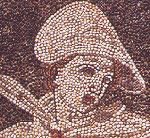Foundation by Isaac Asimov
I'm not thrilled about having to write this review. I know that Asimov's Foundation series is a beloved treasure to many long-time fans of Sci-Fi, and I'm not the kind of person who goes around stomping on other people's picnics. But as benevolent as I may want to be toward Asimov given his productive writing career and his courage to "go down new roads armed with nothing but his own vision" (to borrow a quote from Ayn Rand, out of context), I won't sidestep the obvious conclusion: if this book is any indication, Asimov was not a very good writer.
Based on the Wikipedia entry on Asimov, it appears that I am not the only one who thinks so. The entry states in defense of Asimov, "A considerable portion of such criticism boils down to the charge that Asimov's works are simply dated." Perhaps, but not mine. My criticism involves the man's command of the art of fiction, an art form that pre-dates the rise of Sci-Fi by at least one hundred years.
Here's an example of a key literary problem in Foundation: The plot is not driven by a man. It's not even driven by a machine. It's driven by an abstract idea that transcends eons. Sure, it has a name—Hari Seldon—but this is not really a character at all in any meaningful sense; it's just a moniker for a social theory called psychohistory.
This shadow protagonist is the idea that society is cyclical and can be modeled by mathematics, in other words, after some predictable period of time (?) a society must fall apart under the weight of too much success (!), then it must go through a mystical period, then it must go through a trade period, and so on.
Let's ignore the fact that this is a specious idea. When judging literature as art, the critic should consider only whether the author successfully conveys his theme, not whether his theme has merit. In this case, however, it's actually the theme itself that gets Asimov into trouble.
The theme is enormous—and beyond! The story spans 30 millennia in just under 300 pages!
In order to write a novel that does not consume every shred of wood fiber on planet Earth, Asimov had to make his story leap forward from one epoch to another. He does this by chopping the story up into a succession of mini-plots.
Since the life span of the characters is the same as that of today's humans, each new mini-plot must have its own cast. These men are like house flies that appear in summer and disappear come autumn—and are as memorable. We never care about a single one, and there's no unity between them.
This is an example of what Aristotle called an episodic story. He was not a fan.
The experience of reading such a story ought to be little more interesting than reading an encyclopedia (ironically, if you know the story), except that Asimov displays just enough story-telling talent from paragraph to paragraph that he manages to weave an engaging mini-tale over and over again. It may work if you're patient and very forgiving of the author. Still, I found my willingness to disbelieve stretched beyond its elastic limits so many times throughout the story that reading became an act of will.
Here's another problem: We don’t even see what happens to the main actors in some of the mini-plots, except perhaps through a vague historical reference dropped by some distant descendant—that is to say, by some cog of a man who, like his ancestor, is stuck in one of Sheldon's pre-determined futures. This violates a basic tenet of story-telling: show don't tell. Important events, especially the demise of a main character, should never be narrated.
And yet another problem: We expect to care about the first moving character that we encounter. We assume that he/she will stay with us throughout the entire novel and that we ought to care about him in some way. This was true of Quasimodo, Eddie Willers, Howard Roark, and even Frodo Baggins. Trouble is, Gaal Dornick (the first character in Foundation) meant nothing to the story. He didn’t even really matter to the first mini-plot in which he appeared. This is a major literary mistake. Note to self: never build sympathy for a character you don't intend to use.
As for my overall impression, I go back to Aristotle and his idea of unity. This story shows why Aristotle was right to insist on it. Maybe Asimov knew about this principle. Maybe he thought that his mentioning of Hari Seldon's name now and then would glue his story together. It didn't. The psychohistory premise creates more of a frame around the story than a thread running through it.
But really he could not possibly have unified a story around such an ambitious theme. Even a great philosopher would have had to present an enormous number of concretes in order to demonstrate the kind of change that happens just within a single culture let alone over eons and great distances. Since Asimov could not do it, his story comes off as propaganda. In fact, the ending is mostly narrated instead of demonstrated.
I found myself hoping that the book would end like one of those fun mysteries in which the investigator explains everything just before someone jumps up and declares, "Yes! Yes! I did it! I killed him!". Unfortunately, that didn't happen. The narrator ends the story with a somnambulant description of psychohistory, which leads to nothing but—of all things!—an entry in an encyclopedia.
Certainly nobody important gets killed. Too bad. I was hoping someone would find a way to go back in time and kill Hari Seldon before he could unleash his theory on the unsuspecting universe.


<< Home